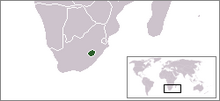LGBTQ rights in Lesotho
 | |
| Status | Legal since 2012[1][2] |
| Gender identity | No specific protection |
| Military | Unknown |
| Discrimination protections | No specific provisions |
| Family rights | |
| Recognition of relationships | Same-sex marriage not allowed |
| Adoption | Joint adoption by same-sex couples not allowed. Single men not allowed. |
Lesbian, gay, bisexual, and transgender (LGBT) persons in Lesotho face legal challenges not experienced by non-LGBT residents.
Laws regarding same-sex sexual acts
In 2012, male same-sex activity was legalized in Lesotho.[1][2]
Male same-sex activity had previously been illegal in Lesotho as a common law offence,[3] but had not been enforced.[4] Female same-sex sexual activity has never been outlawed.[3]
Same-sex marriage
Under the Marriage Act and customary law of Lesotho, marriage is only permitted for opposite-sex couples.[3]
Discrimination protections
There is no specific protection against discrimination based on sexual orientation or gender identity.[3]
Adoption of children
The Child Welfare and Protection Act of 2011 governs adoptions. Only married couples may adopt a child jointly. Single men and same-sex couples are not permitted to adopt.[5]
Living conditions
The U.S. Department of State's 2011 human rights report found that,
The law does not address sexual orientation. However, a law against sodomy existed but was not enforced. While lesbian, gay, bisexual, and transgender (LGBT) persons mainly faced general discrimination in access to health care, the government had not made any formal statement on the issue. Homosexual conduct was taboo in society and not openly discussed. Violence against LGBT persons was known to occur but often went unreported for fear of being ridiculed. Matrix, an LGBT support group, operated freely in all 10 districts. On May 17, [2011,] LGBT community members gathered at a local theater to watch a documentary celebrating the life of a gay South African activist. In September[,] representatives from Matrix and the Ministry of Justice and Human Rights participated in a radio program seeking the views of the general public on LGBT issues.[6]
On 18 May 2013, the first gay pride march took place in the country.[7][8]
Summary table
| Same-sex sexual activity legal | |
| Equal age of consent | |
| Anti-discrimination laws in employment only | |
| Anti-discrimination laws in the provision of goods and services | |
| Anti-discrimination laws in all other areas (Incl. indirect discrimination, hate speech) | |
| Same-sex marriages | |
| Recognition of same-sex couples | |
| Step-child adoption by same-sex couples | |
| Joint adoption by same-sex couples | |
| Gays and lesbians allowed to serve openly in the military | |
| Right to change legal gender | |
| Access to IVF for lesbians | |
| Commercial surrogacy for gay male couples | |
| MSMs allowed to donate blood |
See also
References
- ^ a b State Sponsored Homophobia 2016: A world survey of sexual orientation laws: criminalisation, protection and recognition
- ^ a b Penal Code Act, 2010
- ^ a b c d "Human Rights Violations in Lesotho", excerpt written by Motebo Ntabe, graduate of legal studies at the National University of Lesotho, submitted by the Matrix Support Group for the 2010 Universal Periodic Review of Lesotho, reprinted on the website of the United Nations High Commissioner for Human Rights
- ^ LESOTHO 2012 HUMAN RIGHTS REPORT
- ^ "Intercountry adoption: Lesotho", Bureau of Consular Affairs, United States Department of State, December 2011
- ^ 2011 Country Reports on Human Rights Practices: Lesotho, Bureau of Democracy, Human Rights and Labor, U.S. Department of State, page 15
- ^ Lesotho IDAHO Report 2013
- ^ Small march is a big step for LGBTI in Lesotho
